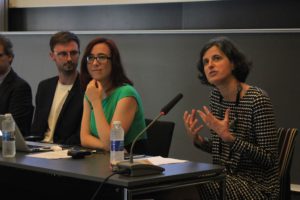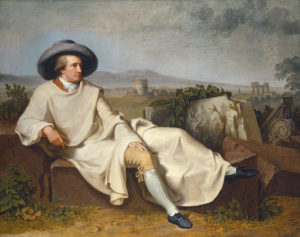While MULOSIGE has preempted some of the critiques Damrosch has made, there is still work to do pushing ‘world literature’ to challenge its own terms more productively

Francesca Orsini, July Blalack and Jack Clift speak at the Institute for World Literature 2017 (courtesy of Solange Manche)
At the seventh annual session of the Institute for World Literature (IWL) in Copenhagen in July 2017, participants were treated to a number of interesting plenary lectures by members of the IWL faculty. The lecture made by the founder of the IWL, David Damrosch (Harvard University), was no exception. As one of the main proponents of ‘world literature,’ Damrosch’s lecture – tellingly titled, ‘What isn’t World Literature? Problems of Language, Context, and Politics’ – offered a number of insights into the thoughts of one of the leading figures in the field. (An earlier edition of this talk at the IWL 2016 can be viewed on YouTube.)
Like other work by Damrosch (including his 2007 article on ‘scriptworlds’), this talk was one of great breadth. From the self-praise of the Sumerian king Shulgi of Ur (who, over 4000 years ago, saw himself as something of a forefather to ‘world literature’), via the contributions of the nineteenth-century comparative literature scholar H. M. Posnett, to the more recent work of Pramoedya Ananta Toer (the Buru Quartet) and Agha Shahid Ali (author of a collection of English-language ghazals, Call Me Ishmael Tonight), Damrosch’s lecture was a geographical and temporal tour de force. Damrosch’s choice of such wide-ranging examples, though impressive in and of itself, was by no means accidental. At the heart of the lecture was a critique of the current state of ‘world literature’ to which these works were designed to speak. And it is to these criticisms in turn that the MULOSIGE project is itself able to respond.
Damrosch’s critiques are pertinent and timely. What’s more, they reflect a number of the concerns of the MULOSIGE project
Damrosch’s comments were three-fold. First, he discussed the problem of genre. ‘World literature’ has for a long time focussed almost exclusively on the novel as a literary form that marks the pre-modern from the modern and, by extension, a disjointed collection of worlds from a seemingly more unified globe. This is in part a testament, Damrosch suggested, to the perceived untranslatability of poetry or other more culturally specific literatures or oratures, to the exclusion of these genres.

Goethe in the Roman Campagna (1787) by Johann Heinrich Wilhelm Tischbein
Second is the problem of time. ‘World literature,’ for the most part, is understood as a discipline that can stretch back only as far as Goethe’s comments on Weltliteratur in the early nineteenth century. As noted in the case of Shulgi of Ur above, some idea of literature of great breadth existed even in the time of the Sumerians. Yet a genealogy extending back only to Goethe excludes this and vast swathes of literature that we might consider ‘worldly’ in one respect or another.
Thirdly, there is the problem of location or geography. ‘World literature,’ Damrosch told us, was ‘not really global enough,’ in the sense that it failed to take in works from outside a particular, small canon. How can ‘world literature’ talk about the ‘world’ when often it speaks only to literature produced in the West? What use is ‘world’ when the dichotomy of ‘West and Rest’ remains functional?
These critiques are pertinent and timely. What’s more, they reflect a number of the concerns of the MULOSIGE project. Our work is not confined to the novel, for instance. July Blalack’s work on manuscript cultures in North and West Africa, and Fatima Burney’s on comparative poetics, are just two examples of attempts to engage with other genres. The project also draws together time periods outside the frame of the modern, post-Goethe ‘world literature.’ The groundwork laid in Francesca Orsini’s previous project on pre-colonial North India has, for example, informed the fundamental theorisations of MULOSIGE. The question of geography, meanwhile, is at the heart of our collaborative work, through which we aim to compare and contrast geographical and linguistic areas that are otherwise rarely considered alongside one another.
The ‘world(s)’ of MULOSIGE – if we can call them that – are of varying scale, and are understood through the prism of their significance to those who reside in them
Yet what remained unproblematised in these remarks by Damrosch is the reliance on a unitary concept of ‘world’ in ‘world literature.’ Various approaches have challenged this singularity by pluralising ‘world,’ ‘literature,’ or both; others gloss over it altogether. One of the most valuable contributions that the MULOSIGE framework makes is that it contests our reliance on terms like ‘world’ or ‘global’ and hones in instead on the ‘local’ and the multifaceted ‘significant geographies’ that exist within it. Not only does the project bring together otherwise disparate linguistic geographies, but it seeks to challenge the assumptions that delineate such geographies in the first place. The ‘world(s)’ of MULOSIGE – if we can call them that – are of varying scale, and are understood through the prism of their significance to those who reside in them. They are not necessarily universal, and they do not exist on a literal global scale.
While MULOSIGE has preempted some of the critiques Damrosch has made, there is still work to do pushing ‘world literature’ to challenge its own terms more productively. Nevertheless, what this lecture illustrated was a continued willingness by even the most ardent of ‘world literature’ advocates to reconsider and reframe the boundaries of the discipline. To my mind, the participants of the IWL programme more broadly reflected this thirst for continued questioning. The discussions that I had with colleagues and peers over the three-and-a-half weeks of the IWL made it clear that the need for nuance is not lost at all levels in the discipline.


Thank you Jack, very useful and timely for us.